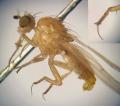Diptera.info :: Family forums :: Asilidae Forum
Page 1 of 2: 12
|
|
Neotropical asilid
|
|
| ChrisR |
Posted on 01-12-2007 18:49
|
|
Super Administrator Location: Reading, England Posts: 7706 Joined: 12.07.04 |
I am fairly sure this fly is an asilid but I'd be glad of some advice. It flew with a very similar bumblebee (see below) so there appears to be some mimicry there. Location: French Guyana ChrisR attached the following image: 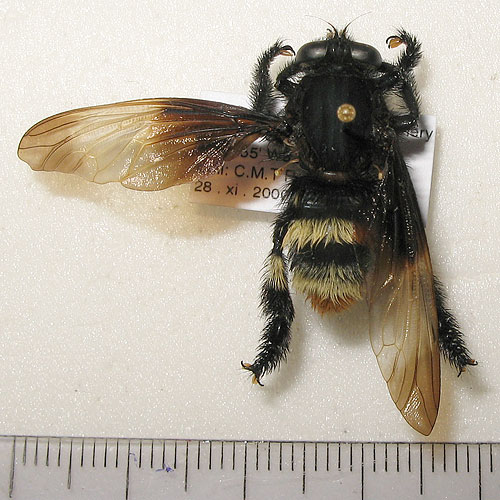 [72.13Kb] |
| ChrisR |
Posted on 01-12-2007 18:55
|
|
Super Administrator Location: Reading, England Posts: 7706 Joined: 12.07.04 |
and the bee...
ChrisR attached the following image: 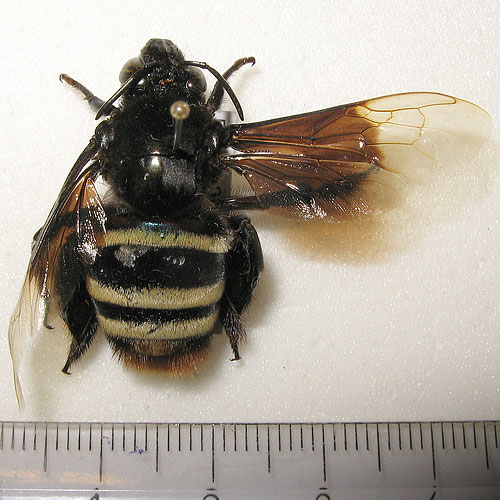 [68.29Kb] |
| jorgemotalmeida |
Posted on 01-12-2007 19:00
|
|
Member Location: Viseu - PORTUGAL Posts: 9296 Joined: 05.06.06 |
amazing mimicry here! |
| Rui Andrade |
Posted on 01-12-2007 20:30
|
|
Member Location: Portugal Posts: 3123 Joined: 19.06.07 |
What a beautiful fly |
| Cor Zonneveld |
Posted on 01-12-2007 22:07
|
|
Member Location: Amstelveen, the Netherlands Posts: 840 Joined: 14.10.06 |
Can you also make available a lateral shot, especially from the head? I'm not an expert at all, so may be I'm totally wrong, but the antennae do not loke very Asilid like. Quite often mimicry is invoked for every furry fly - like Laphria flava. But equally often this idea is not convincing at all - no bumble bee comes to my mind when I see this magnificent Robber fly, L. flava. But here - wow! Wonderful combination of fly and bee, and near perfect match! Wing colour is to me very convincing! Thanks for your attention Cor Zonneveld |
| ChrisR |
Posted on 02-12-2007 01:11
|
|
Super Administrator Location: Reading, England Posts: 7706 Joined: 12.07.04 |
Here's a lateral and a frontal head-shot - sorry they aren't very clear but it does have a very large proboscis - it just likes to hide it between the front legs!  I remember the asilids had another nice aspect to their mimicry. They'd wait on low foliage on sunny paths, like any asilid around the world, but in flight they buzzed, just like a bee 
ChrisR attached the following image: 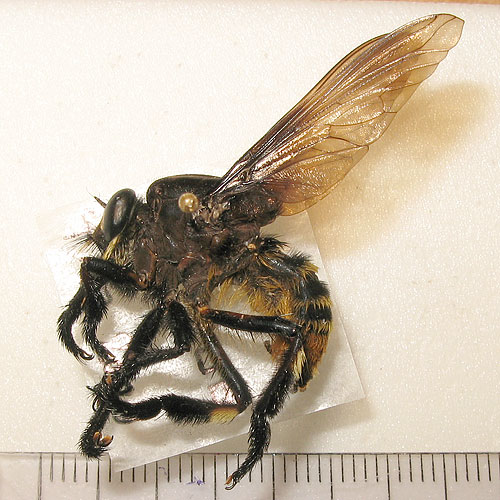 [74.13Kb] Edited by ChrisR on 02-12-2007 01:18 |
| ChrisR |
Posted on 02-12-2007 01:11
|
|
Super Administrator Location: Reading, England Posts: 7706 Joined: 12.07.04 |
head-shot...
ChrisR attached the following image: 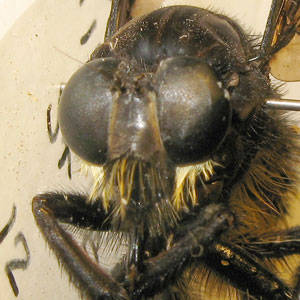 [28.2Kb] |
| ChrisR |
Posted on 02-12-2007 01:12
|
|
Super Administrator Location: Reading, England Posts: 7706 Joined: 12.07.04 |
While I was going through the box I found this one and thought you might be interested. It isn't the same species but it's another nice asilid - with a metallic golden-dusted thorax 
ChrisR attached the following image: 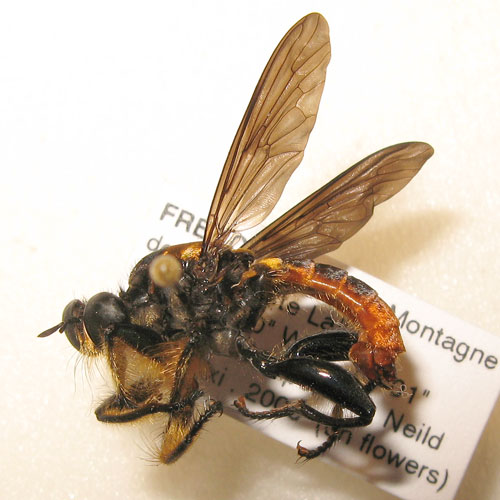 [49.29Kb] |
| Cor Zonneveld |
Posted on 02-12-2007 20:58
|
|
Member Location: Amstelveen, the Netherlands Posts: 840 Joined: 14.10.06 |
Thanks Chris, I never missed the moustache on a Asilid, and yes it's here too! Great flies!!
Thanks for your attention Cor Zonneveld |
| Guenter |
Posted on 02-12-2007 21:33
|
|
Member Location: Dornbirn, Austria Posts: 278 Joined: 09.12.05 |
Compare with Dasyllis haemorrhoa (Brazil) looking like Eulaema cf. bombiformis on the homepage of Fritz Geller-Grimm: http://www.geller...nera12.htm Edited by Guenter on 02-12-2007 21:35 Günter Schwendinger |
|
|
|
| ChrisR |
Posted on 04-12-2007 14:38
|
|
Super Administrator Location: Reading, England Posts: 7706 Joined: 12.07.04 |
Thanks G?nter - those photographs on your link are very convincing. If they are not exactly the same species of bee & asilid they are almost certainly the same genus!  |
| jorgemotalmeida |
Posted on 06-12-2007 14:27
|
|
Member Location: Viseu - PORTUGAL Posts: 9296 Joined: 05.06.06 |
your bee seems really a Xylocopa sp. |
| ChrisR |
Posted on 06-12-2007 23:08
|
|
Super Administrator Location: Reading, England Posts: 7706 Joined: 12.07.04 |
Same shape as Xylocopa - but definitey Eulaema  |
| Eric Fisher |
Posted on 16-12-2007 02:59
|
|
Member Location: California Posts: 435 Joined: 19.05.06 |
Interesting photos Chris. Excellent Eulaema mimicry, to be sure; so good, in fact, that the fly has tricked you! The asilid is Mallophora tibialis, which is in the subfamily Asilinae; Dasyllis haemorrhoa (from Fritz Geller-Grimm's excellent site) is a Laphriinae, tribe Andrenosomatini. These two genera are the most spectacular of the Asilidae that mimic Eulaema but there are others (including cryptic spp. of Dasyllis and Eulaema that all resemble a common model). The Mallophora (Asilinae) has very different antennae and wing venation compared to the Dasyllis (Laphriinae). The second robber fly is probably a Lampria sp. (also Laphriinae). Would you be able to post a dorsal shot - to help with identification? |
|
|
|
| ChrisR |
Posted on 20-12-2007 15:35
|
|
Super Administrator Location: Reading, England Posts: 7706 Joined: 12.07.04 |
Hi Eric - many many thanks for correcting my identification of the first specimen  Here is a lateral shot - the metallic colours don't show very well but they are a little transient. Here is a lateral shot - the metallic colours don't show very well but they are a little transient.
ChrisR attached the following image: 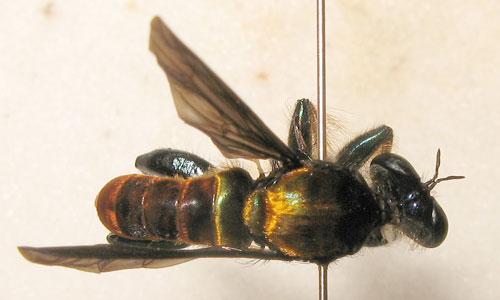 [26.29Kb] Edited by ChrisR on 20-12-2007 16:13 |
| Eric Fisher |
Posted on 20-12-2007 23:06
|
|
Member Location: California Posts: 435 Joined: 19.05.06 |
Hi Chris, Thanks for the second photo. This fly is definitely a Lampria, probably L. dives (Wiedemann). |
|
|
|
| Guenter |
Posted on 21-12-2007 09:09
|
|
Member Location: Dornbirn, Austria Posts: 278 Joined: 09.12.05 |
Thanks for the explanations Eric. I just remembered that I had seen this photo on Geller-Grimm's homepage and didn't have a closer look at it, but the Antenna clearly indicate the different subfamilies!
Günter Schwendinger |
|
|
|
| ChrisR |
Posted on 22-12-2007 12:33
|
|
Super Administrator Location: Reading, England Posts: 7706 Joined: 12.07.04 |
Thanks everyone - I have a few more French Guyanan asilids here so I might post them over the Christmas period if anyone is interested  |
| Eric Fisher |
Posted on 23-12-2007 18:30
|
|
Member Location: California Posts: 435 Joined: 19.05.06 |
Thank you Chris. It would be great to see more French Guyanan robber flies. |
|
|
|
| ChrisR |
Posted on 23-12-2007 21:01
|
|
Super Administrator Location: Reading, England Posts: 7706 Joined: 12.07.04 |
All done - posted as individual threads this time, to reduce confusion - and with one extra specimen from a batch of Malaysian specimens I received a few years ago. Hope you enjoy them  |
Page 1 of 2: 12
| Jump to Forum: |



